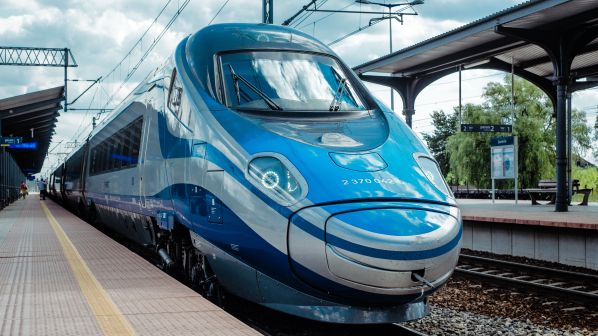PKP Power Engineering has launched what it says is Europe’s largest traction energy storage facility , which will provide power for Poland’s railway network.
The “energy reservoir” has been built in Garbce, in the Żmigród commune, 50km from Wroclaw. It can power a single train travelling at 160km/h and is suitable for use with all electric trains used in Poland. This is possible by using four battery containers with a total of 4240 lithium-ion cells. The storage facility is designed to align with the nature of the rail network, allowing the cells to charge slowly and release stored energy quickly when a train passes
A dc/dc power converter is at the centre of the facility, and this operates directly on dc/dc voltage. In the case of other dc-powered rail systems, traction storage facilities yield ac output that forces dc/ac/dc conversion. Bypassing this transformation significantly improves storage facility operations, resulting in energy savings.
PKP Power Engineering claims the storage facility will strengthen the security and quality of energy supply for the railway, balance the power drawn from the country’s National Power System, and allow for more efficient use of renewable energy sources as part of the Green Rail Programme.
The Garbce plant cost Zlotys 20m ($US 5.3m) and has 5.5MW capacity with a usable capacity of some 1.2MWh.
PKP Energy is planning to install around 300 similar ‘power banks’ across Poland’s rail network, each part of a broader power ecosystem that will include a traction substation and, eventually, the use of renewable energy sources.
“PKP Power Engineering’s investment in Garbce is an extremely important idea, which is entirely consistent with Polish governmental and EU’s policies under the European Green Deal,” says Mr Andrzej Bittel, secretary of state at the Polish Ministry of Infrastructure, in a letter to the participants of the ceremonial launch. “Together, we are building a comfortable, safe and predictable railway, bearing in mind that it is the safest and most environmentally friendly mode of transport.”.
“At PKP Power Engineering, we are consistently and actively expanding the distribution infrastructure in response to the growing needs of Polish railways,” says Mr Marek Kleszczewski, member of the Power Engineering Management Board. “In 10 years, the capacity of the rail system will increase by as much as 42% - up to 6.8GW. Importantly, the facilities under construction are modern and digitised. This means that we apply business data analytics, artificial intelligence and machine learning systems, which guarantees that the energy storage facility opened today will perform its stabilization and efficiency functions even better.”

